高中名词性从句
高中英语名词性从句知识讲解以及练习题 附答案
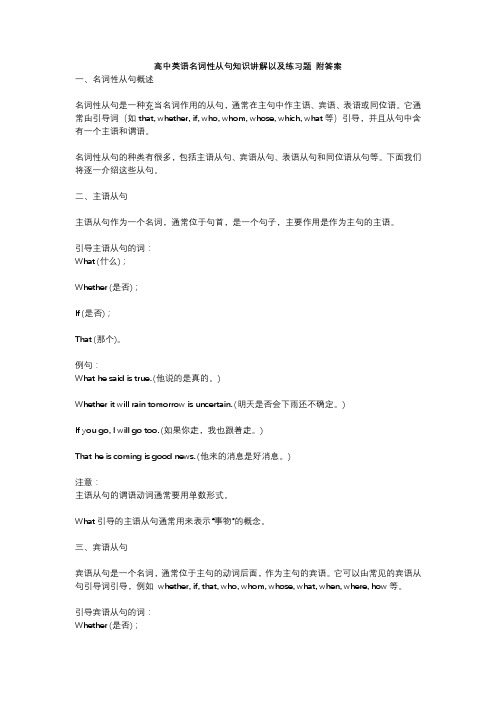
高中英语名词性从句知识讲解以及练习题附答案一、名词性从句概述名词性从句是一种充当名词作用的从句,通常在主句中作主语、宾语、表语或同位语。
它通常由引导词(如that, whether, if, who, whom, whose, which, what等)引导,并且从句中含有一个主语和谓语。
名词性从句的种类有很多,包括主语从句、宾语从句、表语从句和同位语从句等。
下面我们将逐一介绍这些从句。
二、主语从句主语从句作为一个名词,通常位于句首,是一个句子,主要作用是作为主句的主语。
引导主语从句的词:What (什么);Whether (是否);If (是否);That (那个)。
例句:What he said is true. (他说的是真的。
)Whether it will rain tomorrow is uncertain. (明天是否会下雨还不确定。
)If you go, I will go too. (如果你走,我也跟着走。
)That he is coming is good news. (他来的消息是好消息。
)注意:主语从句的谓语动词通常要用单数形式。
What引导的主语从句通常用来表示“事物”的概念。
三、宾语从句宾语从句是一个名词,通常位于主句的动词后面,作为主句的宾语。
它可以由常见的宾语从句引导词引导,例如whether, if, that, who, whom, whose, what, when, where, how等。
引导宾语从句的词:Whether (是否);If (是否);That (那个);Who (谁);Whom (谁);Whose (谁的);What (什么);When (何时);Where (何处);How (如何)。
例句:I know that he is coming. (我知道他要来。
)I wonder if he is telling the truth. (我想知道他是否说了真话。
高中名词性从句详细讲解+例句

名词性从句I. !"#$%&一、定义名词性从句是在句子中起名词作用的句子。
它在复合句中能担任主语、宾语、表语、同位语,分别称为主语从句、宾语从句、表语从句和同位语从句。
二、分类&表语从句1) That is(系动词) a book.S + P 表语2) The fact is(系动词)that he has lied to usS + P 表语从句&宾语从句1) He said(vt) nothing at the meeting.S + P 宾语2) He said (vt) (that) he would help us without hesitation.S + P 宾语从句3) He is interested in (prep) what we want for breakfast.S + P 宾语从句&主语从句1) His mistakes made his teacher angry.主语+ P2) That he made so many mistakes made his teacher angry.主语从句P3)What he said made his teacher angry.主语从句P&同位语从句1) You can turn to my friend Tom for help.S + P 同位语2) The announcement that a new airport was to be built nearby made us excited.S 同位语从句+ P3) We heard the news that the war had broken out between America and Iraq.S + P 同位语从句三、引导词名称引导词在从句中担任成分连接词that, whether, if 不作成分连接代词what, whatever, who, whoever, whose, which, whichever 主语、宾语、表语、定语连接副词when, where, why, how, whenever, wherever, however 状语例如:a. He said that he would come.b. Whether he can pass the exam is not certain.c. He agrees with what I said.d. He agrees with what was said.e. I don’t know what present I should buy.f. That is where Tom used to live.g. That’s why he left.四、名词性从句语序名词性从句用陈述句语序。
高中英语语法名词性从句

规律一:名词性从句在句中要用陈述语序
II.引导词的选择
1. ____ we can't get seems better than ____ we
have. A.What , what C. That , that
B. What , that D. That , what
2. It worried her a bit ____ her hair was turning grey. A.while C.if B.that D.for
规律四:主语从句和宾语从句在适当的情况 下可以借助 “it” 而后置。
1.主语从句可以用it (作形式主语) 来替换成以下几种结构表达。 (A)It is clear/certain/likely /true/surprising that… (B)It is a pity/shame /good idea/no wonder that ...
The question of whether they are male or female is not important. I have not decided whether to go or not.
⑥ whether可引导一个让步状语从句表示 “不管”、“无论”,而if不能,但可以 引导一个条件状语从句表示“如果”如:
• (4)同位语从句 • 就是在句中作同位语的从句。它通常有放在thought, idea, news, word(=news), plan, doubt, question, fact, suggestion, belief等抽象名 词的后面,说明这些词的具体内容或含义。同位语从句大多由that引 导,也可由whether, how, when, where, why等引导,但不能由which 引导。如: • The idea that the earth is round is not a new one. “地球是圆的”这种 观点并不新鲜。He must answer the question whether he agrees to it or not. 他必须回答他是否同意此事这们一问题。 • I have no idea when he will set out. 我不知他什么时候出发。 • 注:有时,同位语从句并不紧跟在它所说明的词的后面。如: • The whole truth came out at last that he was a wolf in sheep’s clothing. 真相终于大白了,他原来是一只披羊皮的狼。
高中英语名词性从句精讲
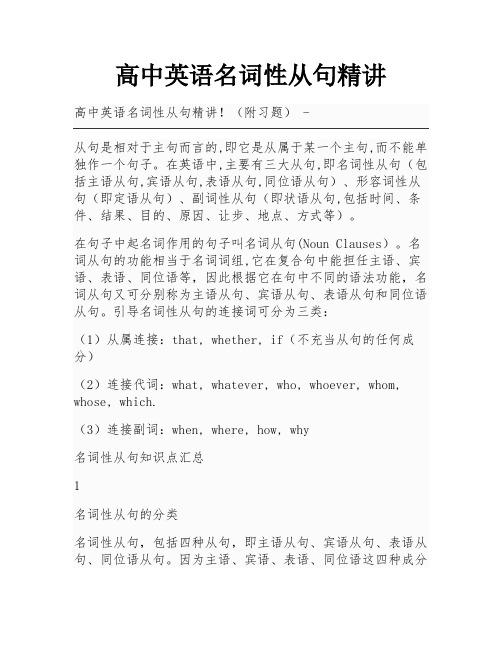
高中英语名词性从句精讲从句是相对于主句而言的,即它是从属于某一个主句,而不能单独作一个句子。
在英语中,主要有三大从句,即名词性从句(包括主语从句,宾语从句,表语从句,同位语从句)、形容词性从句(即定语从句)、副词性从句(即状语从句,包括时间、条件、结果、目的、原因、让步、地点、方式等)。
在句子中起名词作用的句子叫名词从句(Noun Clauses)。
名词从句的功能相当于名词词组,它在复合句中能担任主语、宾语、表语、同位语等,因此根据它在句中不同的语法功能,名词从句又可分别称为主语从句、宾语从句、表语从句和同位语从句。
引导名词性从句的连接词可分为三类:(1)从属连接:that, whether, if(不充当从句的任何成分)(2)连接代词:what, whatever, who, whoever, whom, whose, which.(3)连接副词:when, where, how, why名词性从句知识点汇总1名词性从句的分类名词性从句,包括四种从句,即主语从句、宾语从句、表语从句、同位语从句。
因为主语、宾语、表语、同位语这四种成分均可以由名词构成,所以这四种从句在主句中都充当了名词的作用,故将这四种从句统称为名词性从句。
如:1.That she will help me made us happy.(主语从句)2.I can understand what he said.(宾语从句)3.This is where I was born.(表语从句)4.The fact that a heavy earthquake happened made me crazy.(同位語从句)2名词性从句的连接词分类1.that(无含义,不充当成分)2.whether,if(有“是否”的含义,但不充当成分)3.连接代词:what, whatever, who, whoever, whom, whomever, whose, which, whichever.(在从句中做主语、宾语、表语和定语)连接副词:when, whenever, where, wherever, how, however, why (在从句中做状语)4. as if,as though,because(不充当成分,在名词性从句中只引导表语从句)3连接词 that 在名词性从句中可以省略的三种情况1.it 做形式主语,that引导主语从句时It is said (that) he has been studying abroad.据说他一直在国外学习。
高中英语语法:四种名词性从句讲解与练习
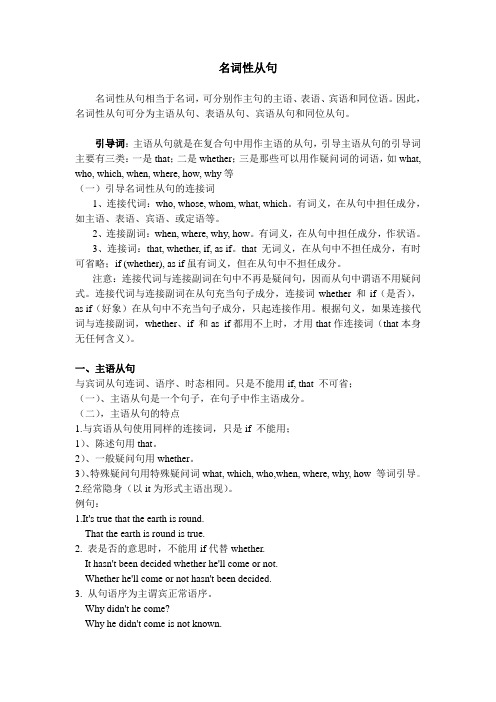
名词性从句名词性从句相当于名词,可分别作主句的主语、表语、宾语和同位语。
因此,名词性从句可分为主语从句、表语从句、宾语从句和同位从句。
引导词:主语从句就是在复合句中用作主语的从句,引导主语从句的引导词主要有三类:一是that;二是whether;三是那些可以用作疑问词的词语,如what, who, which, when, where, how, why等(一)引导名词性从句的连接词1、连接代词:who, whose, whom, what, which。
有词义,在从句中担任成分,如主语、表语、宾语、或定语等。
2、连接副词:when, where, why, how。
有词义,在从句中担任成分,作状语。
3、连接词:that, whether, if, as if。
that 无词义,在从句中不担任成分,有时可省略;if (whether), as if虽有词义,但在从句中不担任成分。
注意:连接代词与连接副词在句中不再是疑问句,因而从句中谓语不用疑问式。
连接代词与连接副词在从句充当句子成分,连接词whether 和if(是否),as if(好象)在从句中不充当句子成分,只起连接作用。
根据句义,如果连接代词与连接副词,whether、if 和as if都用不上时,才用that作连接词(that本身无任何含义)。
一、主语从句与宾词从句连词、语序、时态相同。
只是不能用if, that 不可省;(一)、主语从句是一个句子,在句子中作主语成分。
(二),主语从句的特点1.与宾语从句使用同样的连接词,只是if 不能用;1)、陈述句用that。
2)、一般疑问句用whether。
3)、特殊疑问句用特殊疑问词what, which, who,when, where, why, how 等词引导。
2.经常隐身(以it为形式主语出现)。
例句:1.It's true that the earth is round.That the earth is round is true.2. 表是否的意思时,不能用if代替whether.It hasn't been decided whether he'll come or not.Whether he'll come or not hasn't been decided.3. 从句语序为主谓宾正常语序。
高中英语名词性从句
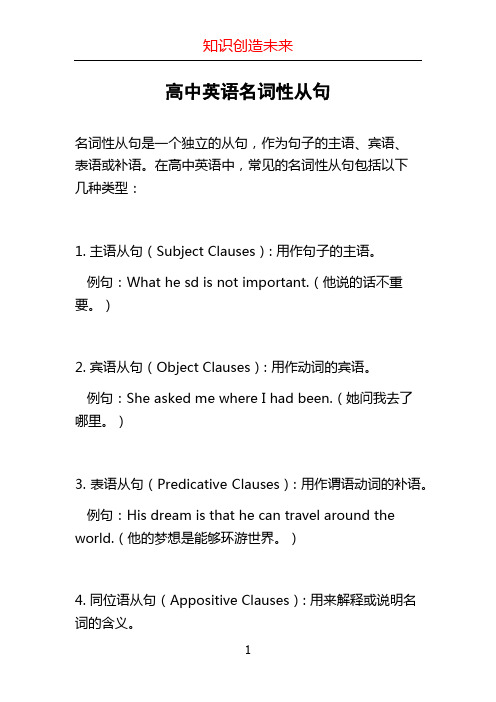
高中英语名词性从句
名词性从句是一个独立的从句,作为句子的主语、宾语、
表语或补语。
在高中英语中,常见的名词性从句包括以下
几种类型:
1. 主语从句(Subject Clauses): 用作句子的主语。
例句:What he sd is not important.(他说的话不重要。
)
2. 宾语从句(Object Clauses): 用作动词的宾语。
例句:She asked me where I had been.(她问我去了
哪里。
)
3. 表语从句(Predicative Clauses): 用作谓语动词的补语。
例句:His dream is that he can travel around the world.(他的梦想是能够环游世界。
)
4. 同位语从句(Appositive Clauses): 用来解释或说明名词的含义。
例句:The fact that he didn't show up disappointed everyone.(他没出现这个事实让每个人都感到失望。
)
5. 定语从句(Adjective Clauses): 用来修饰名词或代词。
例句:The book that I borrowed from the library is very interesting.(我从图书馆借的书非常有趣。
)
这些名词性从句在句子中起着不同的作用,能够丰富句子
的表达方式,并使句子更加准确、丰满。
在学习中,通过
大量的练习可以更好地理解和运用这些名词性从句。
高中英语名词性从句课件(38张ppt)
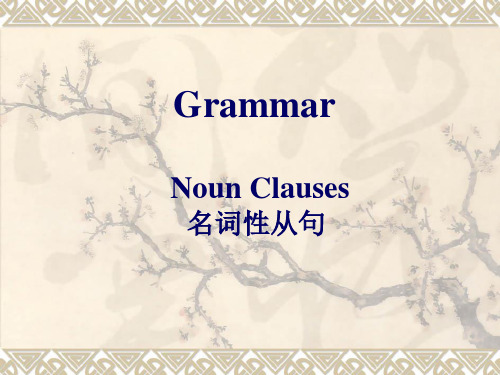
(that在从句中不充当任何成份)
The idea (that/which) he gave surprises many people.
(that在从句中作gave 的宾语)
宾语从句须注意
1) 由疑问词引导的从句中, 词序按陈述句 顺序排列。
e.g. I wonder what he is doing. 注意:I wonder what was wrong /the matter
with him. 2)当主句的谓语动词是过去时的时候, 从句的 谓语动词应用相应的过去时。自然规律和客观 真理例外。
4) That在其他名词性从句中均不可省略,只有 在宾语从句中that有时可以省略,但在并列 的宾语从句中第二个that 不可省略。
e.g. He said (that) he would leave and that he would never come back again.
5) 否定的转移 若主句谓语动词为think, consider, suppose, believe, expect, fancy, guess, 等, 其后的宾语 从句若含有否定意义, 一般要把否定词转移到 主句谓语上, 从句谓语用肯定式。 e.g. I /we don’t think this dress fits you Well, does it?
3. 连接代词: what, whatever, who, whoever, whom,whose, which(哪个): 不仅起到连接一个句子的作用,同时也是从句 的一个组成部分;从句不完整,缺成份。
高中名词性从句详解

名词性从句一、名词性从句分类:在句子中起名词作用的句子叫名词性从句(Noun Clauses)。
名词性从句的功能相当于名词词组, 它在复合句中能担任主语、宾语、表语、同位语、介词宾语等,因此根据它在句中不同的语法功能,名词从句又可分别称为主语从句、宾语从句、表语从句和同位语从句。
二、结构:引导词+陈述语序(主语+谓语+宾语)三、关联词:引导名词性从句的有连接词:that, whether和if;(不充当句子的任何成分)连接代词:what(什么),who(谁),which(哪一个),whose(谁的),whoever(无论谁),whatever(无论什么), whichever (无论哪一个)关系副词:when(什么时候),where(在什么地方), wherever(无论哪儿),why(为什么),how(怎样),how long (多长时间), how soon(多久以后)连接代词和连接副词在句中既保留自己的疑问含义、又起连接作用,在从句中充当从句的成分, 不能省略,语序为陈述语序。
一、主语从句The Subject Clause1. 作句子主语的从句叫主语从句。
主语从句通常由连接词that,whether,if和连接代词what,who,which,whatever,whoever以及连接副词how,when,where,why等词引导。
连接代词和连接副词在句中既保留自己的疑问含义、又起连接作用,在从句中充当从句的成分。
1)连接词that, whether和if等.that 引导主语从句只起引导作用,本身无实际意义,在主语从句中不充当任何成分,但不能省略。
That he will win is certain.他肯定会赢。
Whether he’ll come here isn’t clear. 他是否会来这里还不清楚。
注意: 由that 引导的主语从句有时为了使句子结构平衡, 避免“头重脚轻”, 常用it 作形式主语, 而把从句放在后面。
- 1、下载文档前请自行甄别文档内容的完整性,平台不提供额外的编辑、内容补充、找答案等附加服务。
- 2、"仅部分预览"的文档,不可在线预览部分如存在完整性等问题,可反馈申请退款(可完整预览的文档不适用该条件!)。
- 3、如文档侵犯您的权益,请联系客服反馈,我们会尽快为您处理(人工客服工作时间:9:00-18:30)。
4) That在其他名词性从句中均不可省略,只有 在宾语从句中that有时可以省略,但在并列 的宾语从句中第二个that 不可省略。
e.g. He said (that) he would leave and that he would never come back again.
.
5) 否定的转移 若主句谓语动词为think, consider, suppose, believe, expect, fancy, guess, 等, 其后的宾语 从句若含有否定意义, 一般要把否定词转移到 主句谓语上, 从句谓语用肯定式。 e.g. I /we don’t think this dress fits you Well, does it?
.
宾语从句须注意
1) 由疑问词引导的从句中, 词序按陈述句 顺序排列。
e.g. I wonder what he is doing. 注意:I wonder what was wrong /the matter
with him. 2)当主句的谓语动词是过去时的时候, 从句的 谓语动词应用相应的过去时。自然规律和客观 真理例外。
2. I don’t know who will help Henry to win the bet. 宾语从句
3. His trouble is that he doesn’t know anybody in London. 表语从句
4. The fact that ships can go there surprises many ses
名词性从句
.
Noun Clauses
subjective clause 主语从句
objective clause 宾语从句
predicative clause 表语从句
appositive clause 同位语从句
.
名词性从句相当于名词,可分别作主句的主语、 表语、宾语和同位语。因此,名词性从句可 分为主语从句、表语从句、宾语从句和 同位语从句。 主语从句 1. What it was to become was a mystery.
.
2.连接词 whether, if : 引导名词性从句都意为 “是否”。在宾语从句
中有时可互换。但介词后用whether引导 或whether …or not。在主语从句,表语从句,
同位语从句中不能用if. e.g. He didn’t know whether he was ready or
not.
e.g. I wonder why he was absent. 5.连词 as if, because 只用在表语从句中。 e.g. That is because he was ill.
.
1. 宾语从句 宾语从句在复合句中起宾语作用,可以 作动词的宾语,也可以作介词或形容词 的宾语。
.
1. 作动词的宾语
.
3. 连接代词: what, whatever, who, whoever, whom,whose, which(哪个): 不仅起到连接一个句子的作用,同时也是从句 的一个组成部分;从句不完整,缺成份。
e.g. Whoever breaks the law will be punished.
.
4. 连接副词: when, where, how, why 从句完整,有疑问
.
4. It 可以作为形式宾语 主语+谓语+it +宾语补足语+that +宾语从句 常见的谓语动词是 consider, find, make, regard, see, take, think. e.g. We find it necessary that we practise speaking English every day.
_______________ he did it.
.
. 3. 作形容词的宾语 e.g. I am afraid that I’ve made a mistake. that 引导的从句常跟在下列形容词后作宾语: anxious, certain, convinced, determined, glad, proud, surprised, worried, sorry, ashamed, disappointed, annoyed, pleased, satisfied, content 等。
.
3)连词when 和if 在名词性从句和状语从句中 的时态 I wonder when he __w_i_ll_c_om__e __ (come) back. I’ll tell him the truth when he _c_om__es_ (come) back. I wonder if he __w_il_l _co_m_e___ (come) back. I’ll tell him the truth if he __c_o_m_es (come) back.
e.g. She did not know _w_h_a_t _ had happened. 动词+间接宾语+宾语从句
e.g. She told me _t_ha_t__ she would accept my
invitation. 2. 作介词的宾语
_w_h_a_t__ he did.
e.g. I’m interested in why/when/how/whether
They don’t believe I am right, do they?
.
6) 表示“建议”或“命令”的词有: suggest, propose insist, desire, demand, request, order, command, ask, advise等,它们的宾语从句用虚拟语气, 结构 为: ~ +(that)+主语+(should) do (should 可省)。
.
引导名词性从句的连接词
1.连接词 that : 无实义,不充当从句的任何成分;从句完整; 除部分宾语从句可省略,其他名词性从句中均 不可省略;不可以与which(哪个)互换。
e.g. His trouble is that he doesn’t know anybody in London.
Which team will win the match is unknown.
